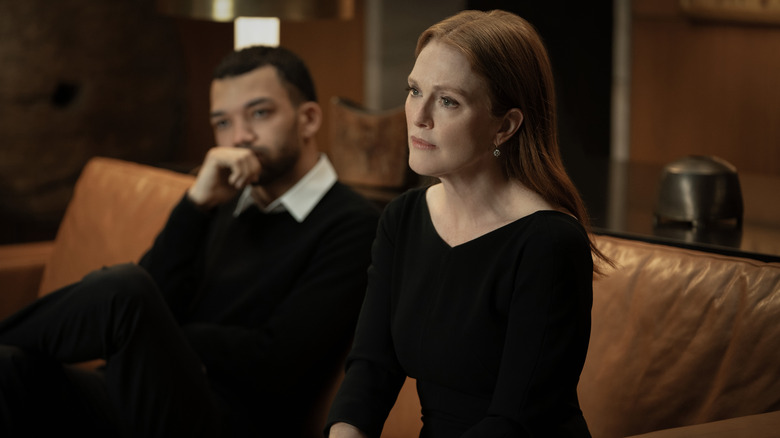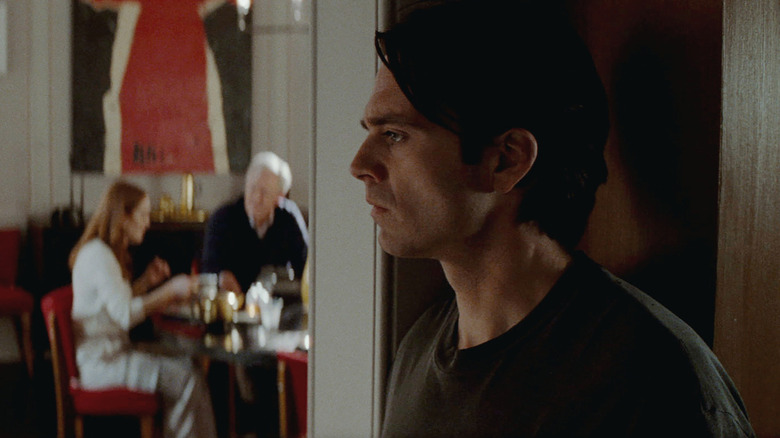How The New Con Movie Sharper Was Influenced By David Fincher's Se7en [Exclusive]
Potential spoilers follow.
Director Benjamin Caron's new feature, "Sharper," certainly takes several pages from the great mystery and heist films of past decades, but manages to make its own story feel fresh and new.
/Film's Ben Pearson spoke with Caron about the project's influences, and interestingly enough, he cited "Seven" as a major tentpole, especially for the thriller's famous ending:
"[There was] even a bit of 'Seven.' The very end of 'Seven,' when they go out to the desert. What I loved about that film is that you were so claustrophobic for such a long period of time. You were held in that city. It was all mainly shot at night and it was [raining], but then right at the very end of the film, you suddenly had this big desert expanse where there was nothing else. There was nowhere else to hide. And I loved the idea that [in "Sharper"], we had all these characters penned into Manhattan, where the sight lines are limited and you can rarely see the horizon. But then, as in "Seven," I love the end where suddenly you're in this open space where you can see nothing but sky, and ultimately the characters have nowhere to hide."
In "Sharper," Caron utilizes the wide, yet dangerous expanse of a building's roof to isolate the characters into confronting one another, much in the same way that "big desert expanse" does in "Seven." Once you hear the director mention it, it's hard to not see the two scenes side by side in your head, right?
Sharper vs. Seven
While the two scenes function the same when it comes to the aforementioned spatial awareness and breaking illusions — Brad Pitt's character discovers his wife has become Kevin Spacey's victim as Pitt's own part in the plan becomes clear, Justice Smith is revealed to have actually been the mastermind of the elaborate web of cons and lies we've been shown — the two differ a bit when it comes to the emotional core of the endings themselves.
In "Seven," there's no denying that the film closes out on a really pessimistic note. Not only does Pitt's partner (the incredible Morgan Freeman) actually find Pitt's wife's head in the box, Spacey's evil plan — to rope Pitt into the plot as well by forcing him to take lethal action against Spacey in retaliation for his wife's murder — goes off without a hitch and lands Pitt's cop character in prison. The film closes with Freeman's character saying, "Ernest Hemingway once wrote, 'The world is a fine place and worth fighting for.' I agree with the second part." It's a plain statement: there is evil all around us, no matter what we do. And it is defeatist in that message.
Sharper's gratification
With "Sharper," the ending is much more optimistic and rooted in justice. Though Julianne Moore and Sebastian Stan's characters believe they have all of Smith's inheritance in the bag, they come to realize that not only is he not dead, but Briana Middleton's character — whom Moore and Stan believed to be on their side — has been working with him the entire time. It's weirdly triumphant. First, Middleton's character swindles Smith out of a large sum of money in the film's opening, tethering the audience sympathetically to this guy who just wants to run a bookstore for the rest of the run time. But also because Moore and Stan are rather heartless in their lifelong professions, and it feels good to see someone get the best of them. It's a satisfaction director David Fincher denies us in "Seven," for good reason. But Caron's decision to give Smith the Spacey role in a way — how he tricks and deceives both the audience and the cop characters into being pawns in a game — gives us the gratification "Seven" strategically withheld. And it feels pretty good.
Caron directed "Sharper" from a script by Brian Gatewood and Alessandro Tanaka. The film is now available to stream on Apple TV+.


